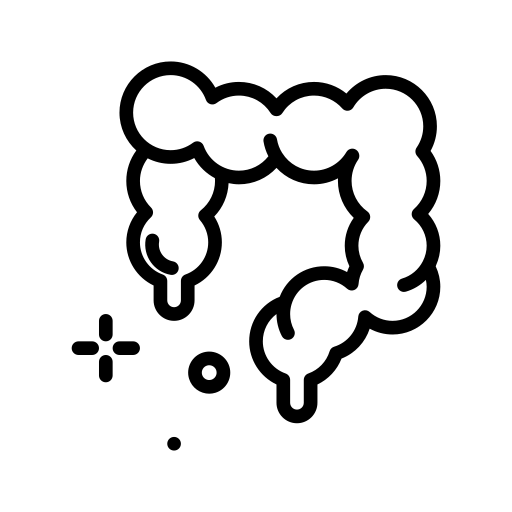- Pack

|
Selection
|
|||||
|
Selection
|
|||||
|
Selection
|
|||||
|
Selection
|
|||||
|
Selection
|
|||||
|
Selection
|
|||||

Irritable bowel
ref LONCO03
Biocyte COLON RESTORE® is a DADFMS with sodium butyrate. COLON RESTORE® meets the nutritional needs of people with irritable bowel syndrome.
Between 5 and 15% of the French population suffers from irritable bowel syndrome also called irritable bowel syndrome (IBS or IBS), ie more than 3 million people affected. This is the consequence of an imbalance of the intestinal flora allowing toxins and microbes to pass through the wall of the large intestine which can lead to local irritation.



The role of the colon
The colon is approximately 1.5 meters long and is located behind the small intestine along the digestive tract. When food arrives at the colon, the vast majority of nutrients have been absorbed. The main role of the large intestine is to absorb water and maintain a good water balance, then to participate in the proper elimination of waste. It is also this intestine that hosts our intestinal flora, with its billions of microorganisms that make up the intestinal microbiota. The colon membrane is impermeable, it is a barrier that does not allow toxins to enter the bloodstream. Only the micronutrients manage to cross this membrane. The colon is lined with cells called colonocytes. The role of the latter is to help the absorption of micronutrients, in particular certain vitamins which are absorbed in the colon, participate in intestinal permeability and form intestinal mucus.
Irritable bowel syndrom
Irritable bowel syndrome is the most common gastrointestinal disorder. It is a functional disease of the large intestine causing a set of symptoms such as bloating, alternating diarrhea and constipation, cramps or fatigue. These symptoms are due to involuntary contractions of the muscles within the colon. Ultimately, this leads to changes in the intestinal microflora.
Sodium butyrate
Sodium butyrate is a fatty acid produced by bacteria constituting the intestinal flora from the fibers of the diet (cereals, fruits, vegetables). This fatty acid is the main source of energy for colonocytes, the cells lining the colon.
A contribution of 30g of fiber per day is recommended to satisfy the production of these fatty acids. Indeed, during diets low in fiber, the fermentation process is insufficient to produce enough sodium butyrate.
COLON RESTORE® is suitable for the nutritional needs of people with irritable bowel syndrome. It is a strictly regulated DADFMS providing 1200mg of sodium butyrate per day.
The capsules may have an unpleasant odor characteristic of sodium butyrate.
The capsule is vegetable and gastro-resistant, that is to say, it protects the active ingredients until they arrive in the colon.
Sources :
Hamer HM, Jonkers D, Venema K, Vanhoutvin S, Troost FJ, Brummer RJ. Review article: the role of butyrate on côlonic function. Aliment Pharmacol Ther. 2008;27(2):104-19.
-SODIUM BUTYRATE
Take 1 to 2 capsules per day with a full glass of water, preferably on an empty stomach. To be consumed preferably for a minimum of 1 month.
Ingredients (for 2 capsules): Sodium butyrate; Capsule of vegetable origin (Coating agent: hydroxypropyl methyl cellulose; Bulking agents: calcium carbonate, microcrystalline cellulose; Anti-caking agent: fatty acid; Gelling agent: gellan gum); Anti-caking agents: magnesium salts of fatty acids, magnesium carbonate.
|
|
Pour 2 gélules |
|
Valeur énergétique |
9.4 kcal |
|
Lipides Dont acides gras |
1g 1g |
|
Glucides Dont sucres |
0g 0g |
|
Protéines |
0g |
|
Sel |
0.36g |
|
Butyrate de sodium |
1200 mg |
Foodstuff intended for special medical purposes for the nutritional needs of irritable bowel syndrome.
This product should be used under medical supervision. It may present a risk if consumed by people who are not prone to irritable bowel syndrome. The product cannot be the only source of food. It is not suitable for children under 12, pregnant and lactating women. Do not administer parenterally. Store at a temperature below 25 ° C, in its tightly closed packaging, protected from light.
SUITABLE FOR VEGANS

Order shipped within 48 hours (France)

Free shipping from 49€ (France)

Secure payment by CB, Paypal and Amazon Pay
Between 5 and 15% of the French population suffers from irritable bowel syndrome also called irritable bowel syndrome (IBS or IBS), ie more than 3 million people affected. This is the consequence of an imbalance of the intestinal flora allowing toxins and microbes to pass through the wall of the large intestine which can lead to local irritation.



The role of the colon
The colon is approximately 1.5 meters long and is located behind the small intestine along the digestive tract. When food arrives at the colon, the vast majority of nutrients have been absorbed. The main role of the large intestine is to absorb water and maintain a good water balance, then to participate in the proper elimination of waste. It is also this intestine that hosts our intestinal flora, with its billions of microorganisms that make up the intestinal microbiota. The colon membrane is impermeable, it is a barrier that does not allow toxins to enter the bloodstream. Only the micronutrients manage to cross this membrane. The colon is lined with cells called colonocytes. The role of the latter is to help the absorption of micronutrients, in particular certain vitamins which are absorbed in the colon, participate in intestinal permeability and form intestinal mucus.
Irritable bowel syndrom
Irritable bowel syndrome is the most common gastrointestinal disorder. It is a functional disease of the large intestine causing a set of symptoms such as bloating, alternating diarrhea and constipation, cramps or fatigue. These symptoms are due to involuntary contractions of the muscles within the colon. Ultimately, this leads to changes in the intestinal microflora.
Sodium butyrate
Sodium butyrate is a fatty acid produced by bacteria constituting the intestinal flora from the fibers of the diet (cereals, fruits, vegetables). This fatty acid is the main source of energy for colonocytes, the cells lining the colon.
A contribution of 30g of fiber per day is recommended to satisfy the production of these fatty acids. Indeed, during diets low in fiber, the fermentation process is insufficient to produce enough sodium butyrate.
COLON RESTORE® is suitable for the nutritional needs of people with irritable bowel syndrome. It is a strictly regulated DADFMS providing 1200mg of sodium butyrate per day.
The capsules may have an unpleasant odor characteristic of sodium butyrate.
The capsule is vegetable and gastro-resistant, that is to say, it protects the active ingredients until they arrive in the colon.
Sources :
Hamer HM, Jonkers D, Venema K, Vanhoutvin S, Troost FJ, Brummer RJ. Review article: the role of butyrate on côlonic function. Aliment Pharmacol Ther. 2008;27(2):104-19.
-SODIUM BUTYRATE
Take 1 to 2 capsules per day with a full glass of water, preferably on an empty stomach. To be consumed preferably for a minimum of 1 month.
Ingredients (for 2 capsules): Sodium butyrate; Capsule of vegetable origin (Coating agent: hydroxypropyl methyl cellulose; Bulking agents: calcium carbonate, microcrystalline cellulose; Anti-caking agent: fatty acid; Gelling agent: gellan gum); Anti-caking agents: magnesium salts of fatty acids, magnesium carbonate.
|
|
Pour 2 gélules |
|
Valeur énergétique |
9.4 kcal |
|
Lipides Dont acides gras |
1g 1g |
|
Glucides Dont sucres |
0g 0g |
|
Protéines |
0g |
|
Sel |
0.36g |
|
Butyrate de sodium |
1200 mg |
Foodstuff intended for special medical purposes for the nutritional needs of irritable bowel syndrome.
This product should be used under medical supervision. It may present a risk if consumed by people who are not prone to irritable bowel syndrome. The product cannot be the only source of food. It is not suitable for children under 12, pregnant and lactating women. Do not administer parenterally. Store at a temperature below 25 ° C, in its tightly closed packaging, protected from light.
SUITABLE FOR VEGANS
- Based on sodium butyrate for nutritional needs in irritable bowel syndrome.
Customers opinion
« Parfait »
Laurence B. Buyer verified
« correspond a mes attentes »
JACQUELINE P. Buyer verified
« EXCELLENT PRODUIT »
Anonymous A. Buyer verified
« bon produit »
Anonymous A. Buyer verified
« Bien pour l’instant »
Anonymous A. Buyer verified
« Déjà une amélioration Mais attends la fin de la boîte »
Anonymous A. Buyer verified
« Super produit à recommander »
Anonymous A. Buyer verified

